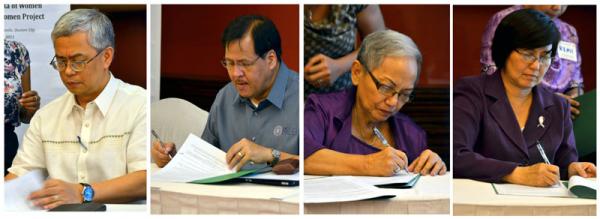PCW and DILG sign MOA to implement the Magna Carta of Women and GREAT Women Project

September 6, 2011, Quezon City – Stressing that women’s interests and gender concerns are non-partisan and generic, Department of Interior and Local Government (DILG) Secretary Jesse Robredo, together with Undersecretary for Local Government Austere Panadero, formalized the DILG partnership with the Philippine Commission on Women (PCW) on the implementation of RA 9710, also known as the Magna Carta of Women (MCW), and the Gender Responsive Economic Actions for the Transformation of Women (GREAT Women) Project.
Philippine Commission on Women (PCW) Chairperson Remedios Rikken said the partnership will augment the commission’s lack of local and regional presence. “DILG’s role in cascading gender and development outcomes at the LGU level is critical especially since the Magna Carta of Women requires all LGUs to have programs, projects, policies and services that respond to the needs of women and men,” Rikken said.
Records obtained from the Bureau of Local Government Development (BLGD) show a “very dismal LGU compliance” in submitting their GAD Plan and Budget and only 104 out of 1600 LGUs have their GAD Code. “I am directing all regional officers to prioritize these (concerns) and push for total compliance not only on the GAD Code and GAD Plan but also on the other requirements of the MCW,” Robredo said.
Robredo added that DILG must be after “compliance with substance” of LGUs. “There must be meaningful engagement and meaningful participation. You may have a GAD Plan but if the disbursement of the budget is not according to the plan, it is as good as not having a plan,” he said. Officers from different DILG bureaus, regional offices and attached agencies did an action plan on the DILG strategies to localize the MCW.
On the issue of women’s economic empowerment, Rikken said the GREAT Women Project, a governance and capacity development project, presents opportunites for the DILG to create a national and local enabling environment in support of women micro-entrepreneurs (WMEs). The project is currently working with 12 national government departments, 8 provincial sites and 36 city / municipal governments. “It is the duty of the DILG to study the GREAT Women pilot project and see how process can be replicated and institutionalized.. By doing so, LGUs can address the issues faced by WMEs such as lack of capital and access to markets, information, credit, training and technology, and social protection” Rikken said.
Robredo, a former local chief executive of Naga City which is one of the pilot areas of the project, said having a strong women’s organization in the LGU is important in implementing the GREAT Women Project nationwide. He encouraged LGUs to consult with women and include their interests in the LGU agenda in order to have “effective structures and mechanisms.”
“Dahil sa MOA signing na ito, papunta na ang DILG sa affirmative action,” Robredo said. The MCW defines affirmative action as a policy action that favors marginalized groups in society, such as women. While it is a special measure, it is not considered discriminatory since it aims to accelerate the attainment of equality of women. Affirmative action should not result in unequal or separate standards and must be discontinued when the objectives of equality of opportunity and treatment have been achieved.
The PCW and DILG partnerships in the past led to the formulation of several GAD-related programs and projects including the Gender-Responsive LGU Ka Ba Self-Assessment (GeRL Ka Ba?) Tool, and the Joint Memorandum Circular 2001-1 which contains the guidelines for the preparation of the annual GAD Plan and Budget of LGUs.

